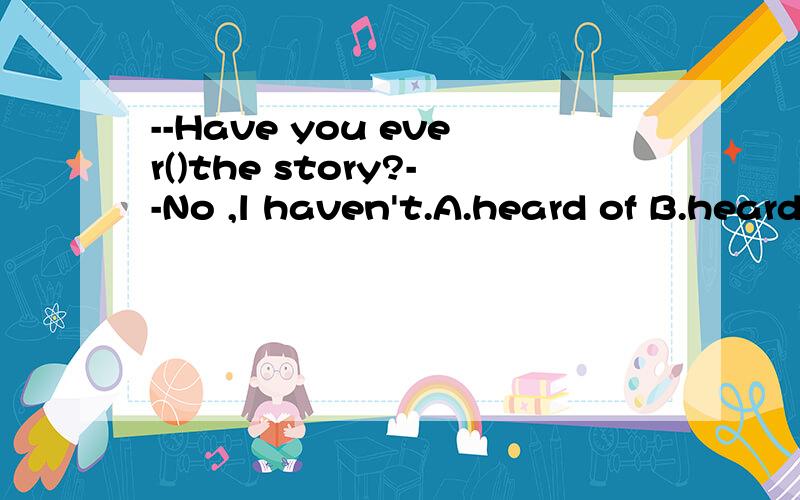--Have you ever()the story?--No ,l haven't.A.heard of B.heard aboutC.A and B为什么选择C
来源:学生作业帮助网 编辑:作业帮 时间:2024/07/17 21:33:16

x����JA�oe:� �X
�;�
V�Z�vEW�3ɿ� (%�P�H6Im/�����[h�]N
f���}��>
���BZ%Ĵ�88T%$U%�9���pt$� �\��D!�yG!���.9
Bа�����Ζq�儏$�k����!��[+Q��S@7��\o��'~l@���׆�ZB�9�M2��1�ٖ�lU)�R��Z��U �-
���D
>�Uct
k-׆�8�}���Y8A�P�|驩�K�˧]���
�6\��\g����ɸ ���Y�M
�����*q�Ͳ�5Ȫ�YT��h��ֱ�7"� ����^�種C{��v���o6A
��>X��unI��͢������*��Q�FZ�z��3Z������U�
--Have you ever()the story?--No ,l haven't.A.heard of B.heard aboutC.A and B为什么选择C
--Have you ever()the story?--No ,l haven't.A.heard of B.heard aboutC.A and B为什么选择C
--Have you ever()the story?--No ,l haven't.A.heard of B.heard aboutC.A and B为什么选择C
A hear of
听说 听到 提起某事 直接指其对象!
I head of this him.我听说过他
Hear about 听到关于某人或某事...
Do you hear anything about him
你听说过他的的任何情况吗
hear of与hear about的意义相近,这两个词组在英语中有时可以通用
A,B两项都表:听说。都用过去分词形式。
have you ever seen the rain中文歌词
Have you ever heard ____ the Disneyland
have you ever visited the USA
have you ever wondered about the stars?
Have you ever heard the word escape?
--Have you closed the door____?--Not_____.A.yet,yetB.ever,yetC.ever,everD.already,ever
造句:Have you ever.
Have you ever heard
Have you ever
have you ever imagined the life in the new centuy
1.Have you ever wine?(drink) 2 Have you ever the four masterwork?(read) 5 Have you ever the Engli
have you ever read the book w__in French
英语翻译What's the best gift you have ever received?
Have you read the book_?用yet还是用ever
Have you ever read the book___(write)byLuXun.
Have you ever visited the Summer P 【填单词】
翻译:have you ever been to the us?
Have you ever seen the film Titanic是什么意思